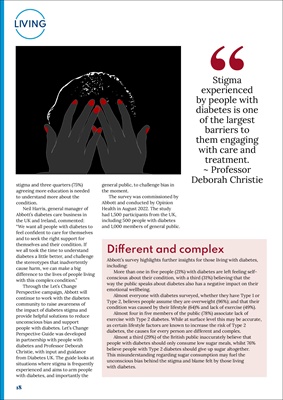
18
LIVING
those with diabetes, which can lead
to negative effects on emotional
wellbeing and health outcomes.
Roughly one in four (24%) people
with diabetes surveyed agree that
others' opinions have affected their
ability to manage their condition.
Stigma is created by a lack
of knowledge and a fear of the
unknown. When people see
something they don't understand
or perceive as scary, they can react
negatively. For people with diabetes
this can play out in many ways
such as food judgement, social or
workplace exclusion, or inadvertently
making hurtful comments. Something
as simple as 'should you be eating
that?' can lead to feelings of blame
and judgement.
Addressing stigma
Professor Deborah Christie,
consultant clinical psychologist
and clinical lead for paediatric and
adolescent psychological services at
University College London Hospital's
NHS Foundation Trust said, "Abbott
has uncovered important findings
about the role that unconscious
bias plays in diabetes stigma and
the negative impact that this can
have. Stigma experienced by people
with diabetes is one of the largest
barriers to them engaging with care
and treatment. If you feel blamed or
judged in any part of your life, then it
can have a significant effect on your
emotional wellbeing, and you will be
less likely to engage with that area."
Abbott has launched a new
campaign in the UK, Let's Change
Perspective to explore the impact of
unconscious bias and to help change
the conversation around diabetes.
This includes a new tool, the Let's
Change Perspective Guide, developed
in partnership with people with
diabetes and Professor Christie, with
input and guidance from Diabetes
UK. The tool aims to empower
everyone to challenge diabetes
stigma in the moment in various
situations such as in work, or hearing
a joke or hurtful comment about
diabetes. Allyship is key in helping to
reduce stigma and improve the lives
of people with diabetes.
Douglas Twenefour, Head
of Care at Diabetes UK, said:
"We welcome the Let's Change
Perspective campaign and guide as,
together, they help demonstrate
the importance of working
collaboratively to address the stigma
that affects people with diabetes.
It's incredibly important that people
with diabetes are supported and
empowered to live their lives and
manage their condition as best they
can, free from stigma."
Professor Christie adds, "It is
critical that the diabetes community
and general public can come together
with compassion and utilise tools,
such as the Let's Change Perspective
Guide, to challenge bias and start to
change the conversation."
Language matters
Despite the public's misconceptions
of diabetes, the survey also found
positive signals for improvement as
the public recognise the impact of
stigma, with approximately half (47%)
agreeing that the language used
to speak about diabetes reinforces
Serious and
complex
Tips for non-diabetics from the
Let's Change Perspective Guide
include:
Avoid comments that pass
judgment on what someone is
eating, or their weight:
People with diabetes
encounter a lot of unsolicited
advice from "Are you really
going to eat that?" to "If you
try this diet/lose weight, you'll
cure your diabetes"
It's important to help
those passing judgement
to understand why it's not
appropriate and telling
someone unsolicited how to
manage their own condition
can be hurtful.
Think about the impact of
words and opinions:
It's important to
acknowledge if a person
with diabetes points out that
something said is disrespectful
and to learn from that moment.
Saying "It's just a joke" may
reinforce the hurt caused. Ask
"How can I make this right?"
Being an ally for people with
diabetes could take some of
the burden away from people
with diabetes, as others speak
up against inappropriate
comments. Try saying "I
wonder if you've considered the
impact of your words. Diabetes
is a serious and complex
condition, and that comment
wasn't appropriate."